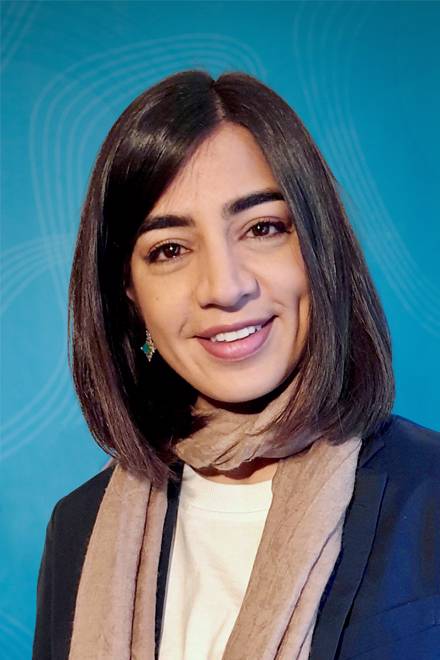- Patterns of global migration
- Climate-induced migration
- Political economy of climate change adaptation in agrarian regions
- Informal labour and rural middle-class formation in low and middle income countries
Maryam Aslany left PRIO in 2022. The information on this page is kept for historical reasons.

Maryam Aslany
Interests and experience
I am an economic sociologist of international development, currently working on the project 'Future Migration as Present Fact' (FUMI) led by Professor Jørgen Carling. Focussing on Cape Verde, Ghana and The Gambia, FUMI explores the impact of unfulfilled migration aspirations, and the ways in which migration that has not yet taken place shapes the lives of individuals and the development of societies.
I received my doctorate in Economic Sociology from King's College London in 2018. My PhD research examined the dynamic processes of new class formation in the Indian countryside, and identified a large but previously neglected group – the rural middle class – whose material situation and social aspirations differed markedly from its urban counterparts. The project used mixed methods, both quantitative and qualitative, including household socio-economic surveys and ethnographic fieldwork, and was based on 18 months of fieldwork in two villages in western Maharashtra, India.
My doctoral project resulted in a monograph, Contested Capital, published by Cambridge University Press (2020). Following my doctorate, in 2018, I conducted a collaborative study of the political economy of climate-change adaptation in Fiji, which was funded by the University of the Sunshine Coast, Australia. This interdisciplinary project looked into the relationship between village communities and the environment, focusing on the processes of production, commodification and consumption, all in the context of islanders' interactions with changing climate.
In 2019, I joined Wolfson College, University of Oxford, as a Career Development Researcher and Junior Research Fellow, where I continued my research on climate change adaptation, with a comparative perspective on India. The project sought to understand how class and other forms of social status (such as ethnicity, caste, religion and gender) impact experiences of climate change, adaptation strategies, and climate-induced migration.
My research is primarily based on mixed methods for handling large national data sets, quantitative field evidence, qualitative case material and social profiles.
Education
- PhD (Economic Sociology), King's College London, UK
- MSc (Contemporary India), University of Oxford, UK
- MCom, University of Pune, India
- BCom, University of Pune, India
Academic positions
- Career Development Researcher, Wolfson College, University of Oxford
- Junior Research Fellow, Wolfson College, University of Oxford
Visiting positions
- Research Associate, African Studies Centre, University of Oxford
- Visiting Researcher, The University of the Sunshine Coast, Queensland, Australia
- Research Associate, CESSMA, Paris Diderot University
- Research Associate, Ashoka University, Haryana, India
- Visiting Scholar, Gokhale Institute of Politics and Economics, Pune, India
Latest publications
Migration drivers across time and space: selected examples
Book chapter in From Uncertainty to Policy: A Guide to Migration Scenarios
Empirical analyses of determinants of migration aspirations
QuantMig deliverable
Systematic review of determinants of migration aspirations
QuantMig deliverable
Latest news
Virtual book launch of 'From uncertainty to policy: A guide to migration scenarios' on International Migrants Day
Can migration be forecasted in today's unpredictable world? How can policymakers and scholars navigate inherent uncertainty, with robust and realistic models?
New Series of Video Portraits from West Africa
The lives and dreams of young adults in three cities are explored in the project Future Migration as Present Fact (FUMI).
Call for Applications: Research Assistant Position at PRIO
PRIO seeks to recruit a full-time Research Assistant, initially for a period of one year, to work on two projects within the PRIO Migration Centre.
Call for Subcontractors for the FUMI Survey in Ghana, Cape Verde and The Gambia
The Peace Research Institute Oslo (PRIO) seeks partners for survey data collection and related tasks in Ghana, Cape Verde and The Gambia
What makes people want to migrate?
Thousands of people have responded to surveys with questions about their wishes or plans for migration and researchers have analyzed the data to identify the drivers.
New team takes mixed methods to the next level
With the hiring of Maryam Aslany, the three-person core team of the project Future Migration as Present Fact (FUMI) is in place.





